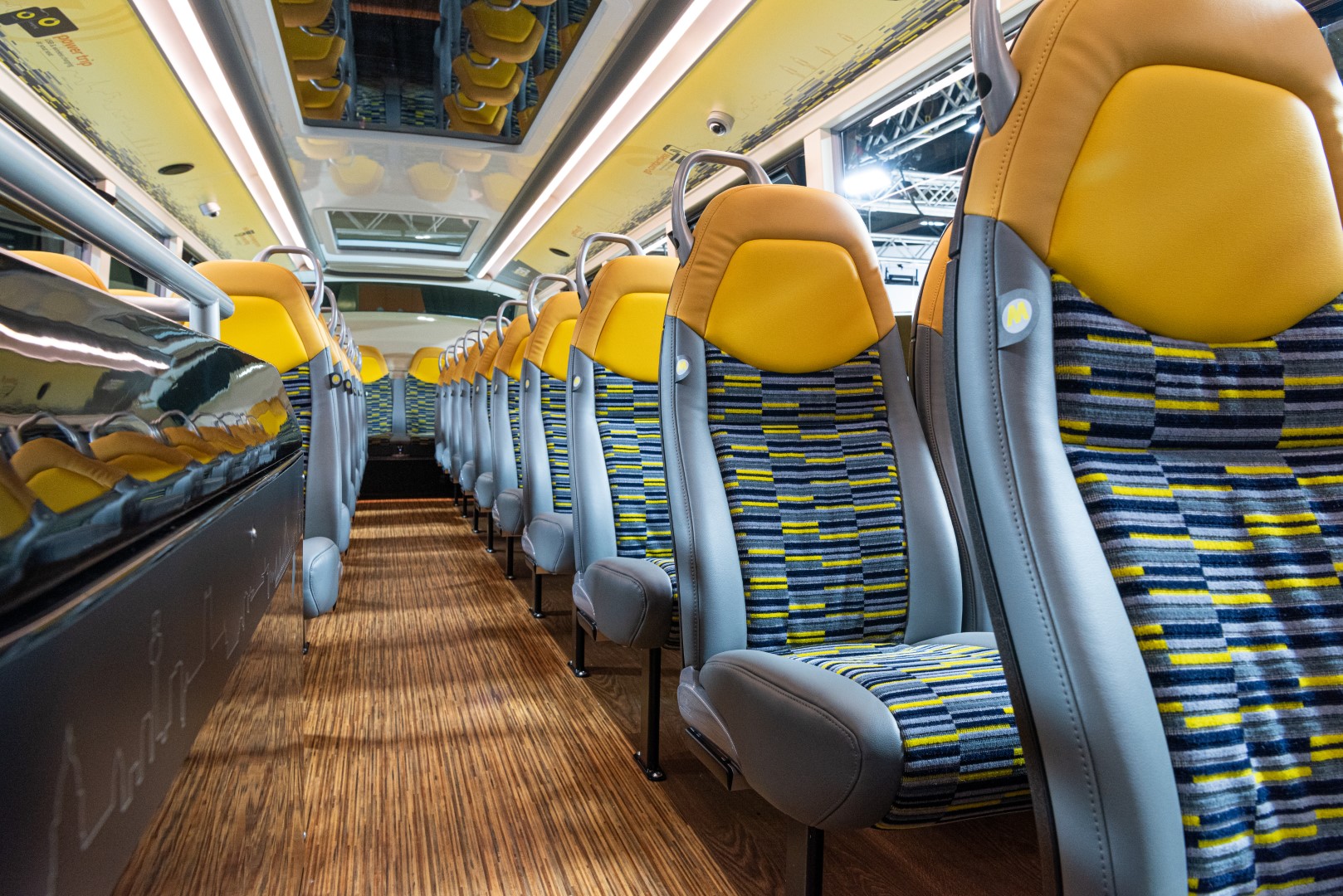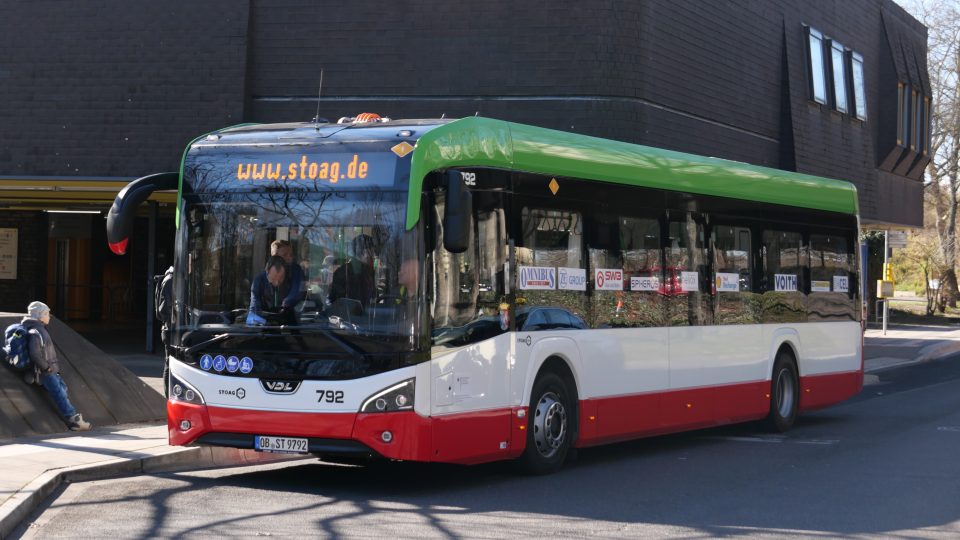Alexander Dennis announces Voith and Impact as driveline and battery partners for in-house electric and H2 bus range
Alexander Dennis today shared an exclusive preview of its next generation of in-house battery-electric buses at Euro Bus Expo 2022 in Birmingham. The first models will be the Enviro400EV double decker and a new-size midibus, the Enviro100EV. Initial orders have been taken and first vehicles are expected in 2023, AD says. Technological partners? Voith provides […]
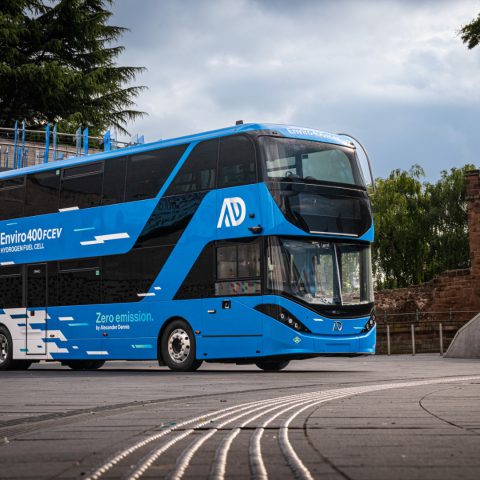
Alexander Dennis today shared an exclusive preview of its next generation of in-house battery-electric buses at Euro Bus Expo 2022 in Birmingham. The first models will be the Enviro400EV double decker and a new-size midibus, the Enviro100EV. Initial orders have been taken and first vehicles are expected in 2023, AD says. Technological partners? Voith provides the VEDS (also chosen by Otokar and Wrightbus so far) and Impact Clean Power Technology the battery modules. Also at Euro Bus Expo, the new generation Enviro400FCEV.
Building on the comprehensive expertise gained as the UK market leader for low, ultra-low and zero-emission buses and benefitting from learnings across NFI Group, Alexander Dennis has developed a new zero-emission technology platform as the basis for a new generation of battery-electric and hydrogen-fuel cell buses. “In addition, the company will continue to offer the buses of the BYD ADL partnership, giving cities, transport authorities and bus operators even more options to meet their operational requirements”, the company stresses.
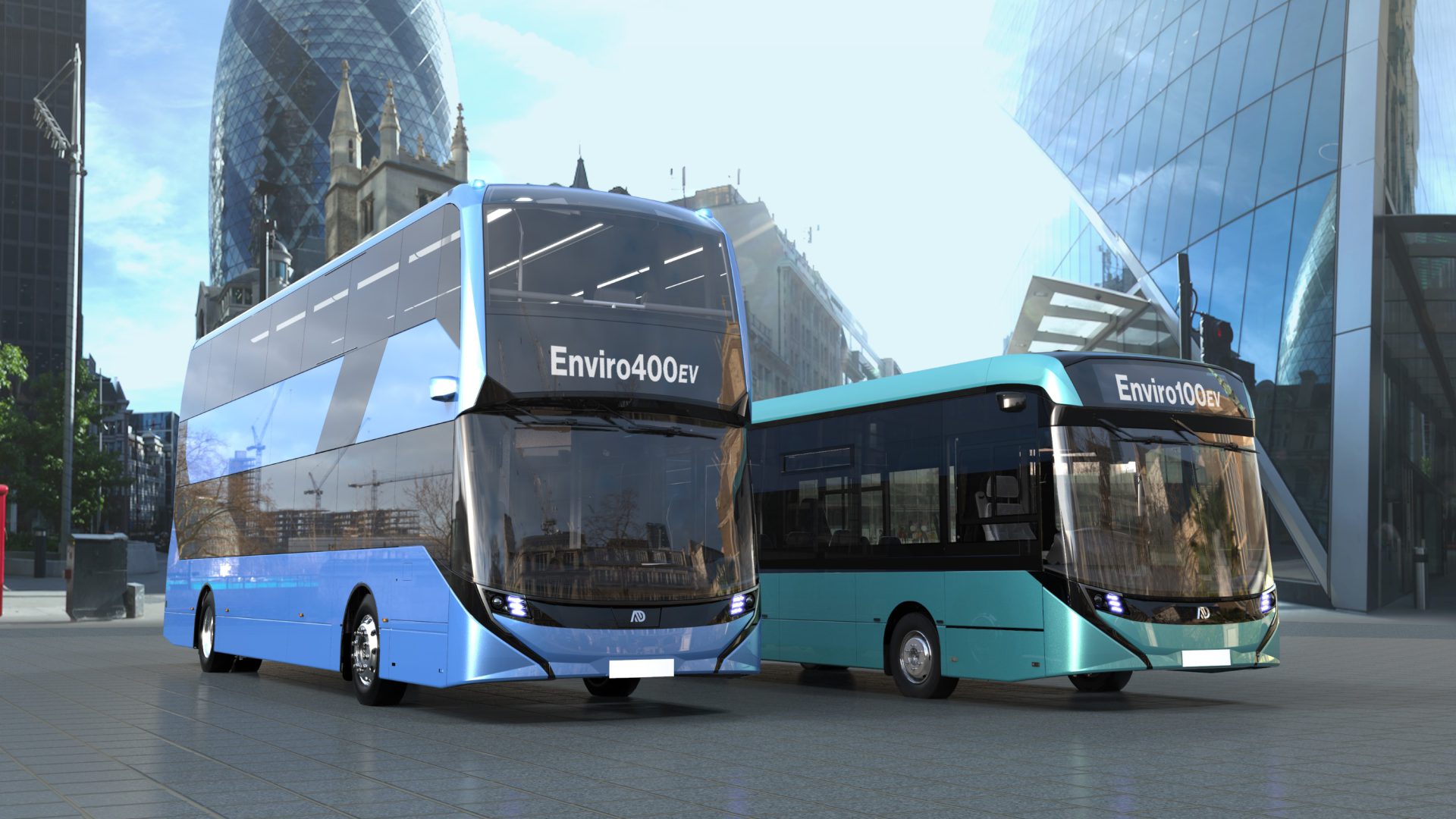
Alexander Dennis preview of new in-house e-buses at Euro Bus Expo
With a total capacity of up to 96 passengers and an operational range of up to 260 miles on a single charge, the Enviro400EV features an improved lower deck seating layout and a wide range of specification options to tailor the vehicle to local needs.
The Enviro100EV is a midibus that is just 8.5m long and 2.35m wide. Configured from the ground up to meet the exact needs of UK operators, it will have up to 25 seats and accommodate a total of up to 45 passengers, making it at home in town streets as much as in country lanes, where a class-leading range of up to 285 miles on a single charge will let it tackle longer routes, says Alexander Dennis.
Voith and Impact as partners
Enviro400EV, Enviro100EV and international models such as the Enviro500EV for Hong Kong share key technologies including a next-generation electric driveline. The choice of the driveline fell on Voith Electrical Drive System. The Enviro400EV uses the heavy-duty variant (VEDS HD), giving the double decker a 410kW peak power output as well as a high maximum running speed and excellent static and dynamic gradeability, while the Enviro100EV midibus uses a medium-duty version (VEDS MD) designed for smaller vehicles.
The new battery system is assembled by Impact Clean Power Technology to an Alexander Dennis proprietary design that standardises packaging and interfaces to the vehicle. Dual sourcing is possible at pack, module and cell level, protecting customers and the vehicle design from adverse impacts of rapid development in battery technology, ensuring continuity of supply throughout vehicle life and allowing operators to benefit from technology advancements at a mid-life refresh without the need for vehicle modifications.
Particular attention has been paid to battery system reliability: Alexander Dennis states that “Underfloor battery packs are mechanically isolated rather than directly bolted to the chassis, protecting them against external loads from twists and impacts that could cause premature failure, and feature a stainless-steel container and aluminium cooling plate to limit the risk of perforation or damage from road debris and road infrastructure. String-level redundancy ensures that the bus remains able to drive home in case of a single fault, reducing the likelihood of breakdowns”.
In its initial application in the Enviro400EV and Enviro100EV, the Alexander Dennis battery system will use heavy-duty, high-density prismatic nickel-manganese-cobalt (NMC) cells that are less susceptible to cold weather performance degradation and have a more gradual state-of-health decline. The Enviro400EV double decker will have 472kWh batteries as standard, with a 354kWh option available to trade range for passenger capacity. On the Enviro100EV midibus, batteries are 236kWh or 354kWh.
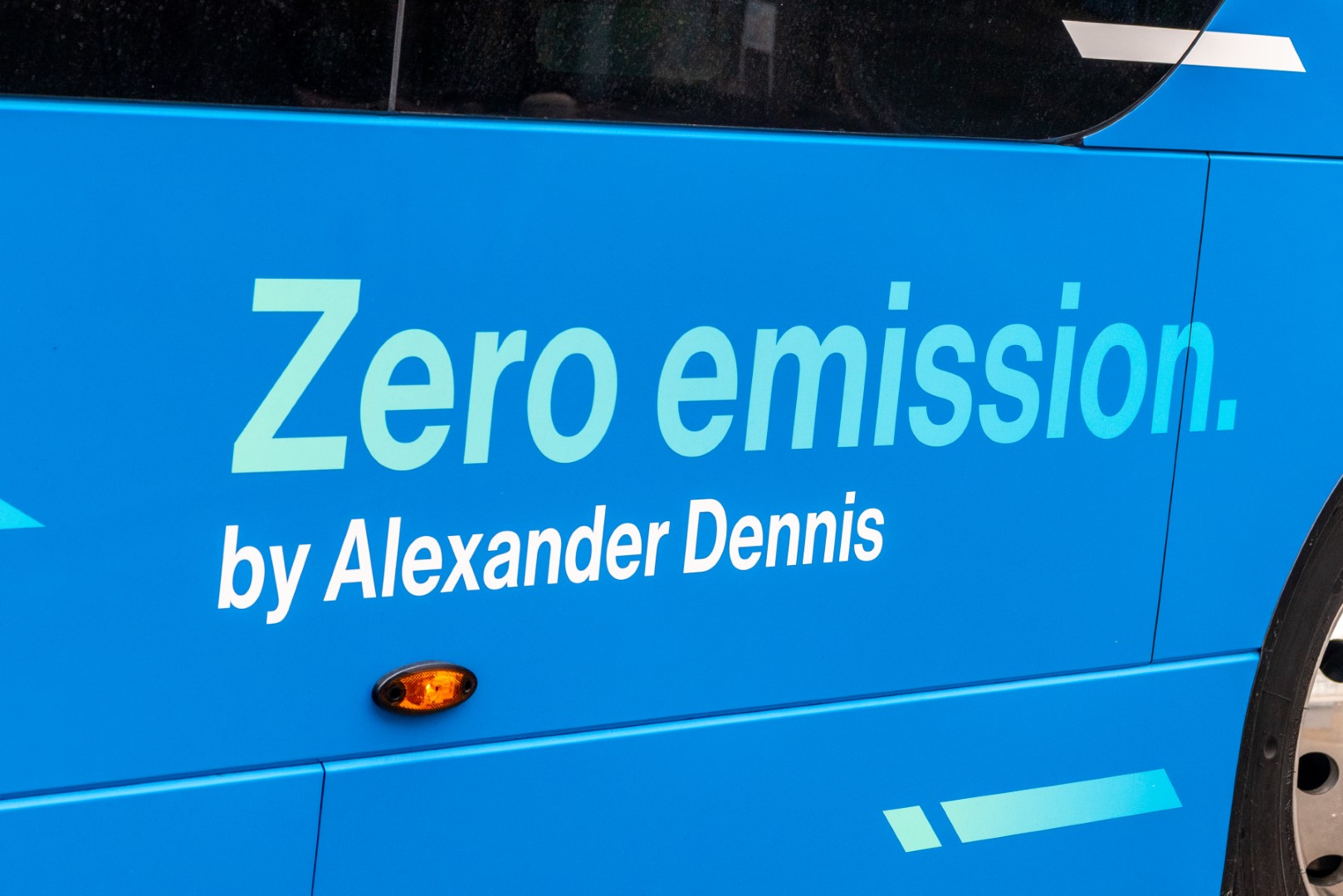
Alexander Dennis new e-bus range: with safety in mind
The new electric buses have been developed with enhanced active and passive safety. Driver visibility is improved with wrap-around glass and minimal A pillar intrusion, while the more strongly raked windscreen reduces internal reflections and reduces the risk to vulnerable road users, who also benefit from an acoustic vehicle alerting system. An electronic park brake and safety interlocks reduce the risk of accidental roll-away. The vehicle design maximises internal flat floor area to remove trip hazards and give enhanced accessibility for all customers, with room for two wheelchair spaces as well as improved headroom at the rear of the lower deck on the double deck bus.
The new zero-emission buses will have whole-vehicle AD24 aftermarket support, giving access to 24/7 spare parts ordering, 50 fully-trained mobile field service engineers across the UK and customer-bespoke training packages through the Alexander Dennis training academy. The advanced NFI Connect telematics suite will be available to enhance vehicle analytics and further boost uptime and efficiency.
Alexander Dennis President & Managing Director Paul Davies says: “Alexander Dennis is taking the next step in leading the ZEvolution with our next generation of zero-emission buses fully designed and built in-house, while continuing our very successful partnership with BYD which has been leading the market for the last six years and will continue to offer excellent products that meet further operational needs. Passenger appeal, performance, efficiency and total cost of ownership are all key principles that have featured in every decision and at every stage during the development of our new battery-electric buses, with no gambles taken or corners cut. The crowd-shifting Enviro400EV and the Enviro100EV, which introduces a big bus feel to the small bus market, are both designed specifically and unequivocally for the specific requirements of bus operation in the UK and Ireland, giving bus operators, transport authorities and cities the best bus for the zero-emission age.”
Alexander Dennis shows also Enviro400FCEV
At Euro Bus Expo Alexander Dennis has also unveiled its Enviro400FCEV hydrogen-fuel cell double decker as part of its next generation of zero-emission buses. The vehicle at the show is the first for the type’s launch customer, the Liverpool City Region Combined Authority.
The 11.1m long Enviro400FCEV can carry up to 88 passengers, up to 73 of them seated and with up to two wheelchair users accommodated in dedicated bays.
Similar to the upcoming new Alexander Dennis battery-electric buses, the Enviro400FCEV utilises the Voith Electrical Drive System. Peak power output of the heavy-duty unit (VEDS HD) has been capped at 350kW on the Enviro400FCEV to maximise fuel economy while still enabling a high maximum running speed and excellent static and dynamic gradeability.
The Enviro400FCEV is fuelled in just five minutes through fillers on both sides of the vehicle. Up to 29.4kg of hydrogen is stored in 350bar NPROXX composite pressure vessels safely mounted at the rear of the vehicle before being converted to electric energy in a Ballard FCmove-HD fuel cell power module that is rated at 45kW or 60kW depending on operational application to optimise efficiency, reduce heat rejection and extend fuel cell life. A 30kWh battery from Impact Clean Power Technology provides on-board buffer storage between fuel cell module and motor. Using lithium-titanate (LTO) chemistry, it is particularly suited to frequent rapid charge and discharge and is expected to last the life of the bus. No external battery charging is required in daily operation.
Alexander Dennis President & Managing Director Paul Davies says: “The launch of the Enviro400FCEV signals the start of a new age for zero-emission buses with our next-generation technology platform. Using the expertise from earlier prototypes as well as our wider experience as the long-established market leader for greener buses, this is a mature product for an industry that needs customised solutions from a reliable partner. Sitting alongside our new battery-electric buses and the hugely successful products we will continue to build in partnership with BYD, the Enviro400FCEV adds a hydrogen-fuel cell bus to what is now the industry’s widest portfolio of zero-emission solutions, ready to meet the requirements of any bus operator, transport authority or city.”
